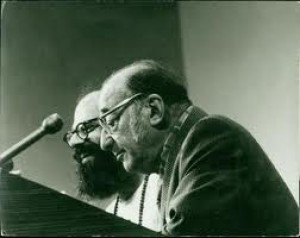Ginsberg's Kaddish
Kaddish and Other Poems, 1958-1960, Expanded Fiftieth Anniversary Edition. San Francisco: City Lights Books, 2010. $9.95 pbk
The 2010 film Howl!, although not a howling success, has stirred an interest in Allen Ginsberg and his poetry not seen since his 1997 death. So it is apt for City Lights, whose founder Lawrence Ferlinghetti heard Ginsberg read Howl! aloud and put that poem as well as Kaddish into print, to offer a new edition of the poet’s second-most famous work. More than a few insiders consider Kaddish his very best.
Bill Morgan, Ginsberg biographer, has provided the reader with as thorough an appreciation of context as we are ever likely to get. If he falls a bit short in this reviewer’s view, it is because the Yiddishist affect and the Old Left twang are likely to evade almost every reader (or scholar) save those who went through the Jewish left-wing movements of the 1920s-40s, now the great majority of them gone. It also may be (and this from a special claim of mine) that only those whose mother has been mentally ill are likely to feel the same mixture of guilt and embarrassment, guilt and revulsion, when they read Ginsberg’s poem.
Kaddish, dedicated to the poet’s mother, Naomi Ginsberg, is at any rate the ultimate Jewish Ginsberg. He offers a thousand reference points, but the ones that always return are Jehovah, the Psalms, the Workmens Circle, Mandolin Orchestras, persecution of Jews by reactionaries and capitalists, and through it all, the mistaken dream of Russia, the workers’ paradise, whose promise would redeem all suffering.
Morgan gives us the real Naomi. Born in 1894 within the Pale, emigrating with family (but not father, who had gone ahead) to America after the 1905 pogroms, Naomi Livergant grew up in the Lower East Side, then Newark. She was bright, qualified as a teacher, and became engaged to Louis Ginsberg, a more quiet type than her effervescent self. Then her mother died in the influenza epidemic of 1918 and she suffered her first mental breakdown. She recovered, married, and became pregnant. Her first son was named after socialist idol Eugene Debs, then in prison for opposition to the First World War.
Louis was a poet and socialist, Naomi an activist and Communist who took her young sons, now including Allen, to left-wing meetings. After pancreatic surgery, she suffered another breakdown, spent time in a sanitarium, and seemed to recover. The family also spent summers in left-wing camps, including a Left-leaning nudist camp in the Catskills. Louis dutifully took on more work to pay for Naomi’s treatments as she got worse, but she attempted suicide for the first time in 1937. From there, things pretty much went downhill, although she continued going to left-wing meetings, worked as a receptionist at the National Maritime Union (and became the staff physician’s lover), and tried to hold on until she couldn’t. In 1947, she had a frontal lobotomy.
By this time, Allen was a busy poet, tortured by many things including the current outlaw status of homosexuality, but perhaps above all by his mother’s fate. On board ship, he scribbled down the lines that would become Kaddish, which his father blessed as one of his best works. He was terrified of what judgment his family might make; when he read a version aloud at Columbia, to 1400 avid listeners, father and son wept.
![[the current issue of ZEEK]](../../image/2/100/0/5/uploads/leftistethicistgraphic-52842c6a.png)
- 5000 Pages of Zeek
- Founded in 2001, Zeek was the first Jewish online magazine, and we have over 5000 pages online to prove it, all available free of charge. Read more in the Archive.
More articles by
- We're on Hiatus!
- Euphoria, Curiosity, Exile & the Ongoing Journey of a Hasidic Rebel: A Q & A with Shulem Deen
- Purim’s Power: Despite the Consequences –The Jewish Push for LGBT Rights, Part 3
- Love Sustains: How My Everyday Practices Make My Everyday Activism Possible
- Poet Q, Poet A: Jews Are Funny! Six Poets on Jewish Humor, Poetry & Activism and Survival
More articles in
Arts and Culture
- Euphoria, Curiosity, Exile & the Ongoing Journey of a Hasidic Rebel: A Q & A with Shulem Deen
- Poet Q, Poet A: Jews Are Funny! Six Poets on Jewish Humor, Poetry & Activism and Survival
- Tackling Hate Speech With Textiles: Robin Atlas in New York for Tu B’Shvat
- Fiction: Angels Out of America
- When Is an Acceptance Speech Really a Speech About Acceptance?


